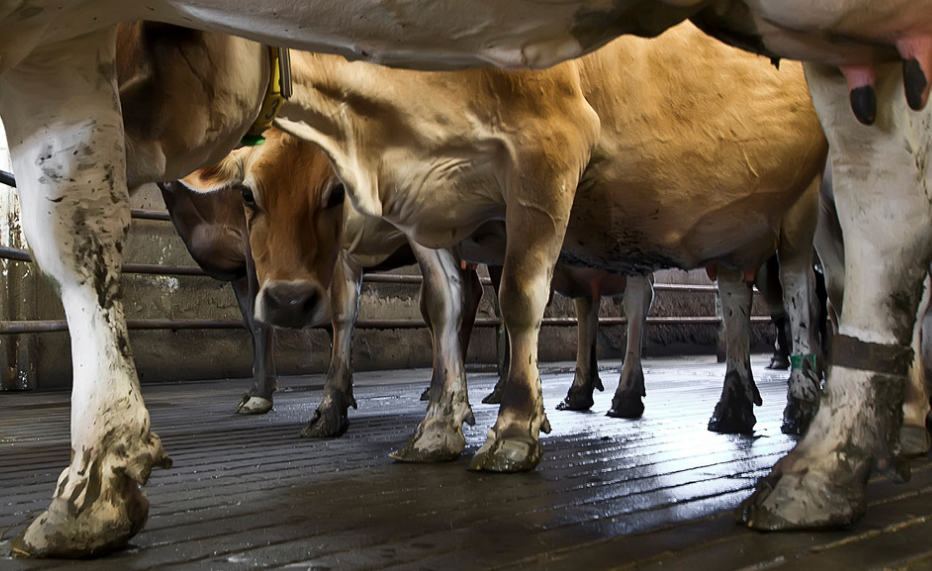Appeals Court Allows Farmers To Keep Feeding Unnecessary Antibiotics To Animals
At issue in the case is 21 U.S.C. § 360b(e)(1), which states that the FDA “shall, after due notice and opportunity for hearing to the applicant, issue an order withdrawing approval of … any new animal drug if the Secretary finds… that experience or scientific data show that such drug is unsafe for use under the conditions of use upon the basis of which the application was approved or the condition of use authorized.”
Advocacy groups like the Natural Resources Defense Council argued that this statute requires the FDA to hold a hearing if it has determined that the use of a drug may be unsafe. The government contends that it doesn’t actually mandate that any such hearing be held, just that a hearing is required before the FDA can withdraw approval.
After years of having petitions ignored or denied by the FDA, the NRDC and others sued to compel the agency to conduct these long-delayed hearings. The lower court agreed, but the government appealed the ruling.
Today, a divided appeals panel came down on the FDA’s side.
“Congress has not required the FDA to hold hearings whenever FDA officials have scientific concerns about the safety of animal drug usage,” reads the opinion of the majority [PDF], which also found that the FDA “retains the discretion to institute or terminate proceedings to withdraw approval of animal drugs by issuing or withdrawing [notices of opportunities for hearings], and that the statutory mandate… applies to limit the FDA’s remedial discretion by requiring withdrawal of approval of animal drugs or particular uses of such drugs only when the FDA has made a final determination, after notice and hearing, that the drug could pose a threat to human health and safety.”
The judges explain that if Congress had intended to “mandate the commencement of the notice and hearing process whenever the agency staff formed a scientific opinion adverse to the drug, it would have stated those intentions explicitly.”
In his dissenting opinion [PDF], Judge Robert Katzmann chides the majority for accepting the view that “Congress gave the FDA discretion to do virtually nothing about that problem for over 30 years — and then, when it finally decided to act, to adopt a different regulatory strategy than Congress expressly provided.”
“Today’s decision allows the FDA to openly declare that a particular animal drug is unsafe, but then refuse to withdraw approval of that drug,” writes Katzmann. “It also gives the agency discretion to effectively ignore a public petition asking it to withdraw approval from an unsafe drug. I do not believe the statutory scheme can be read to permit those results.”
While the appeal was pending, the FDA issued a widely derided (except by those in the drug and meat industries) guidance for industry in late 2013, asking drug companies to voluntarily withdraw the approved non-medical uses of their animal antibiotics and to stop selling these drugs solely for growth promotion.
Problem is, many of the drugs sold primarily for growth promotion are still approved for medical use, meaning farmers only need to now claim they are buying these drugs — which represent 80% of all antibiotics sold in the U.S. — for “preventative” medical purposes.
Meanwhile, millions of Americans fall ill, and more than 23,000 die, every year from drug-resistant bacterial infections.
The hope behind these lawsuits was that they would compel drug makers to back up their unsupported claims that providing medically unnecessary antibiotics to animals is safe. Since decades of research has proven otherwise, it’s likely that the FDA would have had no choice but to remove approvals for these drugs and to restrict their use.
“As previous court rulings made clear, FDA has failed to follow its own scientific evidence and stop this practice. Unfortunately, today’s Appeals Court decision effectively gives FDA a free pass to ignore the science when it is politically inconvenient,” said Jen Sorenson, NRDC attorney. “We will evaluate all our legal options, and we will continue to push to end the dangerous and unnecessary use of antibiotics on animals that are not sick through every avenue available to us.”
Robert S. Lawrence, MD, director of the Johns Hopkins Center for a Livable Future and a professor with the Johns Hopkins Bloomberg School of Public Health, calls the appeals court decision “deeply disappointing” because it “allows voluntary guidelines to take the place of decisive action in confronting one of the most important public health problems of our time.”
David Wallinga of Keep Antibiotics Working that the appeals “has done consumers a serious disservice by failing to order the FDA to ban the overuse of antibiotics on the farm.”
Meanwhile, Congresswoman Louise Slaughter from New York, the only microbiologist in the House and a vocal advocate of curbing unnecessary antibiotic use in animals, reiterated her stance that the FDA needs to address this issue with something other than voluntary guidelines.
“Earlier this week, the President’s Council of Advisors on Science and Technology agreed with the top scientists in the world, including the World Health Organization, and acknowledged a link between the overuse of antibiotics on the farm and antibiotic-resistant infections in humans,” Rep. Slaughter said. “If we have any hope of keeping antibiotics working, we need the FDA to do its job and institute mandatory guidelines to limit routine antibiotic use on the farm, rather than leaving scientific decisions up to courts who may not be qualified to make them.”
Want more consumer news? Visit our parent organization, Consumer Reports, for the latest on scams, recalls, and other consumer issues.


